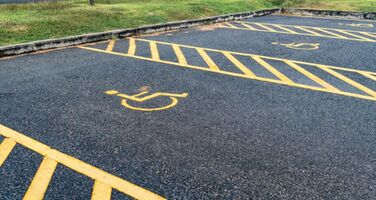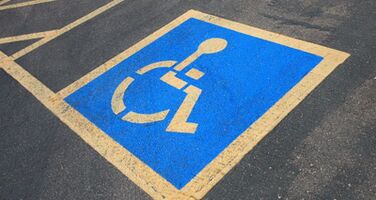
Handicap Placard vs. Handicap License Plates: Which Is Right for You in Washington?
For individuals with mobility impairments or qualifying disabilities, having convenient access to public spaces is essential for maintaining independence and quality of life. In WA, both disability tags (also known as disability placards) and disability license plates offer essential parking privileges that make it easier for those with disabilities to access designated accessible parking spaces, typically located near building entrances. However, while both options provide parking accommodations, they have different advantages, use cases, and eligibility criteria.
Choosing between these two types of passes can be confusing for individuals who are new to the process. This comprehensive guide will help you navigate the differences between a handicap placard and a handicap license plate in Washington, so you can make an informed decision based on your specific needs and circumstances. Whether you're considering applying for a disability parking pass for the first time or want to understand the best option for your current situation, this article will provide clarity on the benefits, requirements, and rules for each.
Understanding Disabled Parking in Washington
Washington State's Department of Licensing (DOL) offers a range of options to assist people with disabilities, making it easier for them to access parking in cities, towns, and public venues across the state. The state recognizes that people with mobility impairments need convenient parking options that reduce walking distances and offer access to ramps, elevators, and other accommodations.
Accessible parking spots are designated with the internationally recognized symbol of access, typically marked in blue or white with the wheelchair icon. To use these spaces legally, drivers or passengers must display a disability tag or disability license plate issued by the state. Understanding the nuances of each option is essential for individuals looking to navigate WA’s disability parking regulations.
What is a Disability Tag?
A disability tag, also known as a disabled parking placard or disability parking permit, is a temporary or permanent pass issued to individuals with mobility impairments. These tags can be hung on the rearview mirror of any vehicle in which the person with a disability is either the driver or a passenger, allowing the vehicle to park in accessible spaces.
a. Types of Disability Tags
WA issues three main types of handicap permits:
- Permanent Disability Tag: This is for individuals with long-term or lifelong disabilities that significantly affect mobility.
- Temporary Disability Tag: Designed for those with temporary injuries or medical conditions that limit mobility, such as after surgery or a severe injury.
- Disabled Parking Permit for Organizations: Non-profits and organizations that transport individuals with disabilities can apply for tags to accommodate their passengers.
b. Who Can Use a Disability Tag?
Any individual with a qualifying mobility impairment can use a disability tag. However, it is important to note that the person with the disability must either be driving the vehicle or riding as a passenger for the tag to be used legally. The tag is associated with the individual, not the vehicle.
c. How Long Are Disability Tags Valid?
- Permanent tags are typically valid for five years and must be renewed.
- Temporary tags have shorter validity periods, ranging from a few weeks to six months, depending on the severity of the temporary condition.
What Are Disability License Plates?
Disability license plates are issued to vehicle owners who have a qualifying permanent disability. Unlike tags, which can be transferred between vehicles, disability plates are affixed directly to the car and are valid for as long as the vehicle is registered.
a. Types of Disability License Plates
WA provides two main types of disability license plates:
- Personal Disability License Plates: Issued to individuals with permanent disabilities who own or lease a vehicle.
- Organizational Disability License Plates: Issued to organizations that provide transportation for people with disabilities.
b. Who Qualifies for Disability License Plates?
Only individuals with permanent disabilities qualify for disability license plates. You must own or lease the vehicle to which the plates are attached.
c. The Role of Permanent Disabilities in License Plate Issuance
Because disability plates are meant for permanent conditions, they offer a long-term solution for individuals who need accessible parking on a continual basis. If your condition is temporary, a disability tag is usually the more appropriate option.
Qualifying Medical Conditions for Handicap Placard and License Plates
To receive either a disability tag or disability license plates in WA, applicants must meet specific eligibility criteria based on their qualifying medical condition and the impact it has on their mobility.
Medical Conditions That Qualify
The WA State Department of Licensing (DOL) has set specific medical criteria for individuals who can apply for disability parking passes. Qualifying conditions include:
- Inability to walk more than 200 feet without stopping to rest.
- Severe lung disease, such as chronic obstructive pulmonary disease (COPD), that limits mobility.
- Use of portable oxygen.
- Severe cardiac conditions classified as Class III or Class IV by the American Heart Association.
- Dependence on mobility aids such as wheelchairs, walkers, crutches, or canes.
- Severe neurological, orthopedic, or arthritic conditions that affect walking.
- Legally blind individuals.
These medical conditions must be certified by a licensed healthcare provider, such as a physician, nurse practitioner, or podiatrist, who will verify that the applicant’s mobility is significantly impaired.
Temporary vs. Permanent Eligibility
There are two types of disability passes based on the duration of the disability:
- Permanent Eligibility: For individuals whose mobility impairments are long-term or permanent. These applicants can apply for either permanent disability tags or disability license plates.
- Temporary Eligibility: For individuals with short-term mobility impairments due to surgery, injury, or other temporary medical conditions. These individuals can apply for a temporary disability tag, which is valid for up to one year.
Who Can Certify Eligibility?
A licensed healthcare provider must certify that an individual meets the eligibility criteria for a disability parking pass. This can include:
- Physicians (MD or DO)
- Nurse practitioners (ARNP)
- Physician assistants (PA)
- Podiatrists (for lower limb impairments)
- Chiropractors (for mobility-related issues)
The healthcare provider will complete a section of the application form verifying the individual’s disability and how it impacts their ability to walk or function in public spaces.
Benefits of Disabled Permits in Washington
Flexibility of Use Across Multiple Vehicles
One of the primary advantages of a disability tag is its portability. Disability tags are not tied to a specific vehicle, which means they can be used in any vehicle in which the person with the disability is traveling. Whether the individual is driving or riding as a passenger, the disability tag can be easily transferred between vehicles, offering flexibility.
This makes disability tags ideal for individuals who:
- Do not own a vehicle but frequently travel with others.
- Switch between multiple vehicles, such as using different family cars.
- Use rideshare services or public transportation that may involve varying pickup vehicles.
Temporary and Permanent Options
Disability tags are available for both temporary and permanent disabilities:
- Temporary disability tags: If your condition is expected to improve, you can apply for a temporary tag. Once your condition improves, you are no longer eligible for accessible disabled parking privileges.
- Permanent disability tags: For long-term or permanent disabilities, you can apply for a permanent tag that can be renewed as needed.
When a Disability Tag Is the Best Option
A disability tag may be the best option if you:
- Frequently ride in or drive different vehicles.
- Do not own a vehicle but rely on others for transportation.
- Have a temporary disability or expect your condition to improve.
Benefits of Disabled License Plates in Washington
Permanently Affixed to Your Vehicle
Disability license plates are issued for vehicles owned or leased by individuals with qualifying disabilities. Once affixed to your vehicle, the plates serve as a permanent indicator that the vehicle is authorized to park in accessible spaces. There is no need to display a tag each time you park, making this a more convenient option for those who drive regularly and own their vehicle.
No Need to Display a Tag Each Time You Park
One of the significant benefits of disability license plates is the elimination of the need to display a tag every time you park. For individuals who may forget to hang their disability tag or do not want the hassle of remembering it each time, disability plates are a more convenient alternative. The plates themselves serve as permanent proof that you are authorized to use accessible parking spaces.
When Disability License Plates Are the Best Option
Disability license plates are a better choice if you:
- Own or lease a vehicle in your name.
- Prefer the convenience of not having to display a tag each time you park.
- Drive primarily one vehicle and do not frequently switch between vehicles.
How to Apply for Handicap Placards in Washington
Step-by-Step Application Process for Disability Tags
Applying for a Washington handicap placard involves the following steps:
Obtain the Application Form: Download the Disabled Parking Application for Individuals (Form TD-420-073) from the WA State DOL website or pick up a copy at your local licensing office.
Complete the Personal Information Section: Provide your name, address, driver’s license or ID number, and contact information.
Get Medical Certification: A licensed HandicapMD healthcare provider must complete the medical certification section of the form, verifying that you meet the eligibility requirements for a disability tag.
Submit the Application: Submit the completed application by mail or in person to the WA State Department of Licensing. Be sure to include any required identification.
Receive Your Disability Tag: Once your application is approved, you will receive your disability tag by mail, usually within a few weeks.
Required Documentation for Disability Tags
When applying for a disability tag, you will need to provide the following:
- A completed Disabled Parking Application for Individuals (Form TD-420-073).
- Proof of identity, such as a WA State driver’s license or state ID card.
- Medical certification from a licensed healthcare provider.
There is no fee for disability tags in WA, but you will need to renew your tag every five years.
How to Apply for Handicap License Plates in Washington
Step-by-Step Application Process for Disability License Plates
To apply for handicap placards in WA, follow these steps:
Obtain the Application Form: Download the Disabled Parking Application for Individuals (Form TD-420-073) or the Special License Plate Application for Disabled Veterans (Form TD-420-500) from the WA State DOL website.
Complete the Personal Information Section: Provide your vehicle registration information, personal details, and the make, model, and license number of the vehicle.
Get Medical Certification: A licensed HandicapMD healthcare provider must complete the medical certification section unless you are a veteran with a disability applying through the VA.
Submit the Application: Mail the completed form to the WA State DOL or visit a local licensing office.
Receive Your Disability License Plates: After your application is processed, you will receive your disability license plates, which will be mailed to you.
Required Documentation for Disability License Plates
When applying for disability license plates, you will need:
- A completed Disabled Parking Application for Individuals (Form TD-420-073) or Special License Plate Application for Disabled Veterans (Form TD-420-500).
- Proof of ownership of the vehicle (such as registration documents).
- Medical certification from a healthcare provider or proof of VA disability rating for veterans.
There may be standard registration fees for applying for disability license plates, depending on the type of vehicle you own.
Which Is Right for You: Disability Permit or License Plate?
When choosing between a disability tag or a disability license plate, consider your specific needs and lifestyle.
a. Factors to Consider
- Duration of Disability: If your disability is temporary, a tag is a better option. For permanent disabilities, a license plate may be more convenient.
- Vehicle Ownership: If you don't own or regularly drive the same vehicle, a portable tag is more practical.
- Frequency of Use: If you drive multiple vehicles or rely on others for transportation, the flexibility of a tag is beneficial.
b. Tailoring Your Choice to Your Needs
Ultimately, the choice between a disability tag and a disability license plate depends on your personal situation. A tag offers portability, while a plate provides long-term convenience for those who primarily use the same vehicle.
Renewal Process and Expiration of Disability Permits and License Plates
Both disability tags and license plates in WA require periodic renewal:
- Permanent disability tags are valid for five years and must be renewed.
- Temporary disability tags expire according to the time frame set by your healthcare provider.
- Disability license plates need to be renewed when you renew your vehicle registration, usually every year or two.
Penalties for Misuse of Disability Tags and License Plates
Misuse of disability parking tags and plates is a serious offense in WA. Penalties can include fines of up to $450 and the revocation of disability parking privileges. Misuse includes using the tag or plate when the individual with a disability is not present, altering the tag, or using someone else’s tag illegally.
How to Properly Display Disability Tags and License Plates
To avoid fines and ensure you are using your parking accommodations correctly:
- Tags: Always hang the tag on the rearview mirror when parked in an accessible space. Remove it before driving to avoid obstruction.
- Plates: Ensure that your license plates are properly affixed to the front and back of your vehicle.
Out-of-State and Reciprocal Privileges
WA disabled permits and plates are recognized in most other states, but it’s important to familiarize yourself with local laws when traveling out of state. Likewise, most other states’ disability tags and plates are recognized in WA.
Washington’s Efforts to Prevent Abuse of Disability Parking
WA has implemented various measures to prevent the misuse of disability parking passes, such as increasing penalties and requiring stricter documentation to obtain tags and plates.
Common Questions About Disability Tags and License Plates
1. Can I Have Both a Disability Tag and Disability License Plates?
Yes, in WA, you can apply for both a disability tag and disability license plates. This is helpful if you want the convenience of plates for your primary vehicle but also need the flexibility of a tag when traveling in other vehicles.
2. How Long Are Disability Tags and Plates Valid in WA?
- Disability tags are valid for five years and must be renewed.
- Disability license plates are valid as long as the vehicle is registered, but they may need to be renewed when your vehicle registration is due.
3. Can I Use My Disability Tag or Plates in Other States?
Yes. Disability tags and plates issued in WA are recognized in other U.S. states under the Americans with Disabilities Act (ADA). You can use them in designated accessible parking spaces nationwide, but be sure to check local parking regulations regarding fees and time limits.
4. What Happens If I Lose My Disability Tag or License Plate?
If you lose your disability tag or license plate, you should contact the WA State Department of Licensing to request a replacement. There may be a small fee for replacement, and you may need to provide proof of identity and vehicle ownership.
5. Can Someone Else Use My Disability Tag or License Plate Without Me?
No. Disability tags and plates are issued to individuals based on their medical condition. They cannot legally be used by someone else unless the person to whom the tag or plates were issued is in the vehicle. Misuse of a disability tag or plates can result in fines and revocation of parking privileges.
Conclusion
Deciding between a disability tag and disability license plates in Washington depends on your personal needs, vehicle ownership, and usage patterns. Disability tags offer flexibility for individuals who frequently travel in different vehicles or who don’t own a vehicle, while disability license plates provide convenience for those who regularly drive their own vehicle and want a more permanent parking solution.
Both options provide essential benefits to people with disabilities, making public spaces more accessible and reducing the physical strain of navigating parking lots. Whether you opt for a tag, plates, or both, understanding the application process and the rules for each option will help you make the right choice for your circumstances.
.png)






